|
DRCNet in Afghanistan
Drug War Chronicle editor Phil Smith is on the scene...
Thanks to support from the company Dr. Bronner's Magic Soaps, intrepid Drug War Chronicle
editor Phillip S. Smith spent two weeks doing a drug war tour of Afghanistan. Following are his daily logs and links to his seven in-depth reports from the trip.
This week's in-depth Afghanistan coverage:
PROHIBITION
AND
TERROR
--
THE
AFGHAN
CONNECTION
Among
the
forces
working
to
sustain
extremist
organizations
like
Al
Qaeda
is
one
that
policymakers
don't
like
to
talk
about
in
direct
terms
--
drug
prohibition.
AFGHAN
OPIUM
FARMERS
CAUGHT
IN
THE
SQUEEZE
With
opium
the
unquestioned
mainstay
of
Afghanistan's
economy
but
the
government
eradicating,
rural
Afghans
are
getting
caught
in
the
squeeze.
Elders
in
a
village
north
of
Jalalabad
told
the
story
in
an
interview
given
to
DRCNet
this
week.
AFGHAN
OPIUM
CONUNDRUM
--
WHAT
TO
DO
WITH
WARLORDS,
POLITICIANS
INVOLVED
IN
THE
DRUG
TRADE?
With
the
government
of
President
Hamid
Karzai
attempting
to
solidify
nascent
national
government
institutions,
Afghans
inside
the
government
and
out
ponder
how
to
address
the
problem
of
members
of
the
government
and
other
powers
who
are
involved
in
the
illicit
opium
trade.
QUESTIONS
AND
ANSWERS,
GIVE
AND
TAKE
--
AFGHANS
TAKE
ON
THE
SENLIS
COUNCIL
AND
ITS
LICENSING
PROPOSAL
Curiosity
and
intrigue
mingled
with
worry,
skepticism
and
even
hostility
last
week
as
a
European
think
tank's
proposal
to
license
Afghan
opium
growing
for
medical
uses
got
discussed
in
Kabul.
EDITORIAL:
THE
CONSEQUENCES
OF
PROHIBITION
(WAS
"WHAT
IS
IT
ABOUT
OPIUM?")
With
Phil's
Afghanistan
adventure
soon
to
come
to
a
close,
we
reprint
this
October
2001
editorial
by
David
Borden
that
closely
relates
to
some
of
the
topics
Phil
discusses
in
the
four
special
Afghanistan
reports
published
in
this
issue.
click here for last week's coverage
October 6:
I head for the
airport in a few minutes. Kabul to Dubai to London to Atlanta to Seattle,
and then 400 miles in the pick-up back to the mountains of BC. Ugh.
I leave Afghanistan enlightened,
but also confused. I have been enlightened about just how difficult everything
is here -- from finding a working Internet cafe when the power goes out
to driving to the nearest city -- but confused about just why, nearly four
years after the US invasion, everything remains so wretchedly Fourth World.
Why is the main highway from Kabul to Pakistan still pretty much a dirt
track? Why has the US and the rest of the West not gotten around to ensuring
that they can keep the lights on in Kabul? I truly do not understand, and
no one has been able to provide me with a satisfying answer.
|
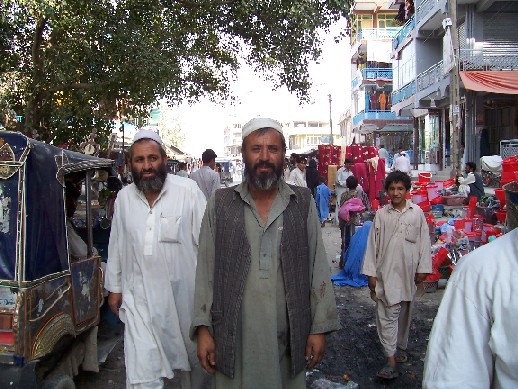 |
|
in Jalalabad
|
I also leave enlightened
about the intractability of Afghan development issues. With the physical
infrastructure in such a profoundly sorry state and with the national government
only in nominal control of much of the national territory, I can see why
economic development will be tediously slow. And like the NGO people and
development experts, I am confused about just how to go about speeding
up the process. Especially with an illegal commodity providing half the
national income. If official US and Afghan policy toward opium were to
actually work (which is fortunately unlikely) and the opium economy were
to vanish tomorrow, the country would come to a grinding halt. How to do
development when the liveliest economic sector in the country is under
the board? This is a question to which no one seems to have a good answer.
The Senlis Council proposal
to license some sort of the crop seems like seems like a start. But given
my knowledge of official US attitudes on drug policy, I have to assume
that so reasonable a proposal will never be enacted. It would "send the
wrong message," although to whom I am not sure.
I leave here feeling
like I have accomplished too little -- although I have my excuses all lined
up: I was sick, too many holidays, the mysterious vanishing electricity
-- and desirous of doing much more. I would like to actually see the country,
but given the state of transport here, that would require an extended vacation.
Alright, I'm gone. Next
time you hear from me, it'll be from North America.
more pictures to be posted,
check back...
October 5:
I'm all set.
I have the Ariana ticket for Friday; I have the money from Western Union.
Both turned out to be incredibly simple to accomplish. [Written after
an incredibly arduous effort at the DRCNet office to make a simple itinerary
change -- Phil wanted to stay an extra few days to get to speak with some
farmers out in the countryside and for other interviews.]
I am sicker than a dog.
After I got up early this morning to run my travel errands, I came back
here and slept for about five hours. I have the cold from hell, plus fever
plus muscle aches plus extreme tiredness. It just took me about half an
hour to decide to get out of bed. I have no clue where I got this crud;
the list of usual suspects is almost endless here: the water, the air,
the food, the heat, the dust...
Hussein, the hotel's
college-educated waiter, cooked me up a deadly broth of garlic and hot
peppers, and Dr. Nick, a Greek NGO guy, procured me "Flueze," a powder
that you pour into hot water. It's got paracetimol and some other stuff
in it. I don't know if these things are working, but I certainly slept
soundly for most of the day.
So, I'll see who I can
talk to tomorrow, and then I'll crank out the Chronicle, I guess.
The US Embassy is all
in a tizzy. The Afghans managed to capture this guy who was head of the
gang that kidnapped those Italian women aid workers a few months ago, so
now the Embassy fears revenge attacks. They have ordered all Embassy staff
to avoid the Intercontinental Hotel and EVERY restaurant in town, and they
recommend that all US citizens in the country do the same. They also recommend
never going out alone. They also recommend not being here in the first
place. If I listened to those Embassy pansies, I'd still be in North America.
October 4:
Phil is safely back
in Kabul from his journey outside the city. Here is a preliminary report
-- it really starts to get to the heart of why the drug war in Afghanistan
is an issue. Look for more in Drug War Chronicle this Friday and next.
- DB
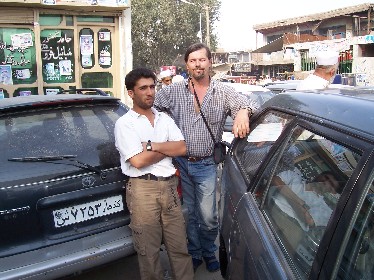 |
|
| Phil & Hakimi |
|
I just returned
from a down and dirty trip over the mountains to Jalalabad, the last main
city on the road to Pakistan, in search of the elusive poppy. I was accompanied
by my driver, Hakimi, complete with AK-47 under the front seat, and Jalalabad
native Abdullah, who knows the local scene. The highway between Kabul and
Jalalabad is an absolute nightmare, unpaved most of the way, scraped out
of the mountainside, rocky, and covered in dust, and going up and over
some godawful mountains (and back down again). In fact, in some places
the dust is two inches thick on the roadbed. Now I understand why those
Arab guys are always wrapping their kaffiyas around their faces.
I could go on about the
road, but suffice it to say I've been on logging roads in Canada in better
shape, and without the heavy truck and bus and Toyota Corolla and camel
and donkey traffic. Dust so thick we had to come to a complete stop on
numerous occasions. But enough...
|
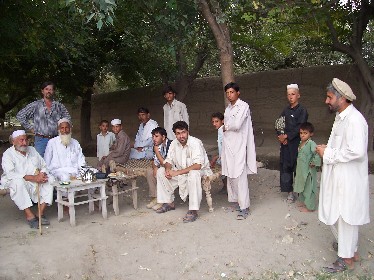 |
|
Phil with villagers
|
In Jalalabad, we hooked
up with Abdullah's relative Jawid, who directed us a couple hours north
of the city into some sketchy territory in search of opium farmers. Despite
the alleged sketchiness (this is eastern Afghanistan near the Pakistan
border where the Taliban and Al Qaeda play), there was no sign of any trouble.
We managed to meet with the elders of a district up there who had grown
poppies in the past, and quite profitably, thank you! They told me that
growing poppies gained them about seven times the income they got from
growing food crops. The downside was that last year the government chopped
it all down, so they had a big fat goose egg for a harvest. The government
promised to help them, they said, but no help ever came. They're not too
pleased about all this.
Current poppy growers
have been pushed further into the badlands. They told me if we went four
or five hours up further into the mountains, we could find them, but that
territory is getting really dangerous, so we passed.
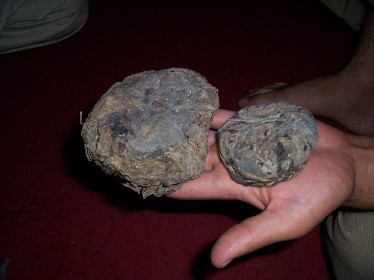 |
|
| the trader's wares... a pound of opium |
|
Instead, we settled for
meeting up with a Jalalabad opium trader. He was, unsurprisingly, quite
security conscious. Didn't want to talk much, and certainly didn't want
his picture taken or any photos that might identify his location. But he
did let me take some pics of his wares. He said the two balls of opium
he showed me were about 500 grams (+/- one pound), and he wanted $100 for
that much. Well, I didn't have any use for a pound of opium, so I persuaded
him to just slice me off a tiny sliver. Inquiring minds want to know...
Then it was back to Kabul
this morning after spending the night in the Springar Hotel in Jalalabad.
The hotel has a plaque commemorating four journalists who left there in
November 2001 for Kabul during the height of the US invasion, but who were
murdered by the Taliban in the Kabul River gorge. That's the same place
where the Pashtuns finished off a British expeditionary column (and its
Indian retainers) in 1842. The Brits sent a 16,000 man force to subdue
Kabul, failed, then tried to escape back to the garrison at Jalalabad.
The last of them made it as far as the gorge. Only one man, a British doctor,
made it out alive.
more pictures coming here soon
October 3:
We're waiting to hear from Phil in Jalalabad, which reportedly has at least one Internet cafe. Phil and his guide/transport/interpreter/bodyguard took off this morning in quest of opium farmers to interview and opium fields to photograph. It's 8 1/2 hours later there, about 8:00pm at the time of this writing. There's a chance he won't be able to write until he gets back to Kabul -- Internet connectivity and electricity for that matter are spotty even in the capital -- so we may just have to wait, but hopefully we'll hear from him sooner. Phil was expecting to have to spend the night there -- though only 100 miles from Kabul, it is a six hour drive because of the quality of the road, and bandits roam the area after dark.
In the meanwhile, some more pictures from Kabul:
|
Military chopper heading for Kabul airport. Phil writes: "I'm outside the Supreme Supermarket, which caters to Westerners. Notice the security checkpoint you have to go through and the guard shining the mirror under the car. I couldn't get into the store because I didn't have my passport with me! On the plus side, I had a nice conversation with the security guard/interpreter (for dealing with Westerners), who is doing graduate work in English literature at Kabul University."
|
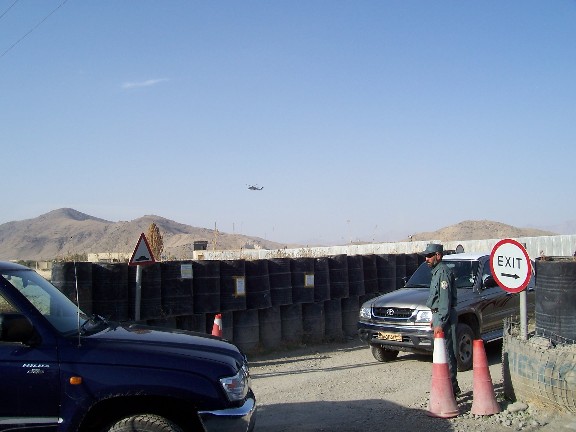 |
|
View going up the mountain with the TV and radio antennas. This is a peak that rises probably 2000 feet above the city, though note that houses go right up the mountain. Land up there is free, so this is where poor people go. Very tough. They have to carry everything up the mountain, and it gets very cold up there in the winter, too.
|
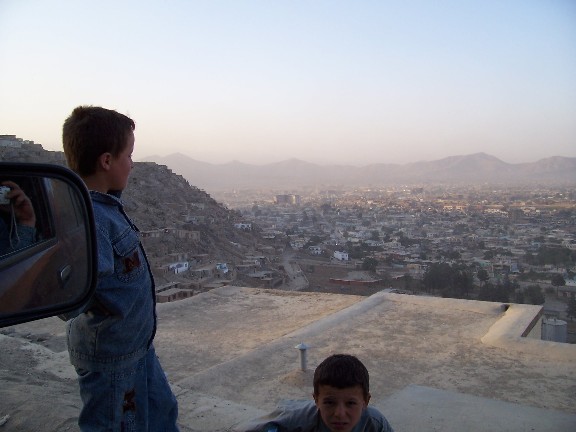 |
|
Phil on the mountain
|
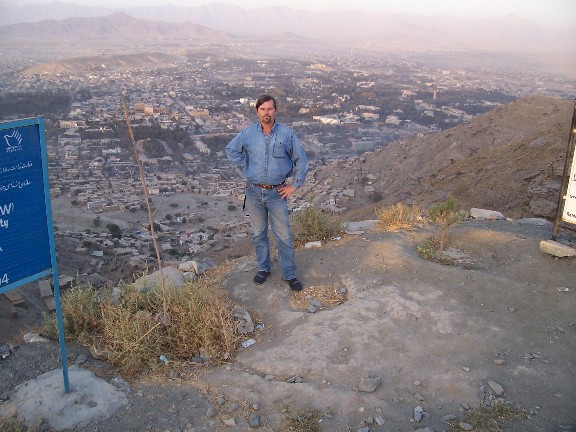 |
|
The red and white rocks mark minefields. This mountain top was a very hand place from which to shell the city during the intra-mujahadeen conflict of the early 90s. Also, note the wall/fortification going all the way up the next mountain, build hundreds of years ago.
|
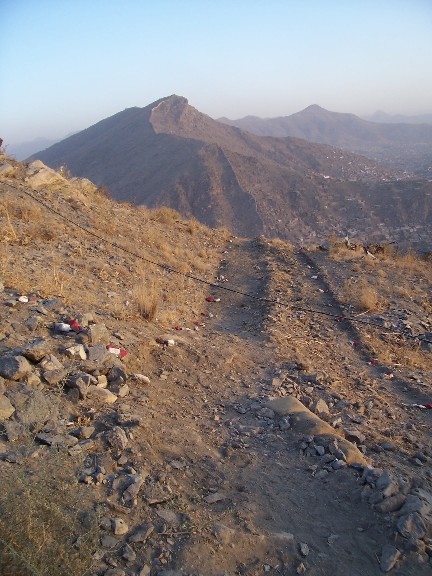 |
|
another shot of the minefield markers
|
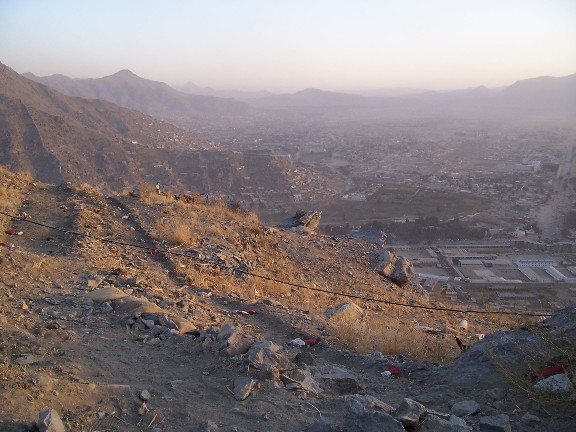 |
|
Chicken Street--Afghan rugs with topical themes. The one on the left commemorates victory over the Taliban; the one on the right the 911 attacks. (American and other readers might not like that last one, but it's there.)
|
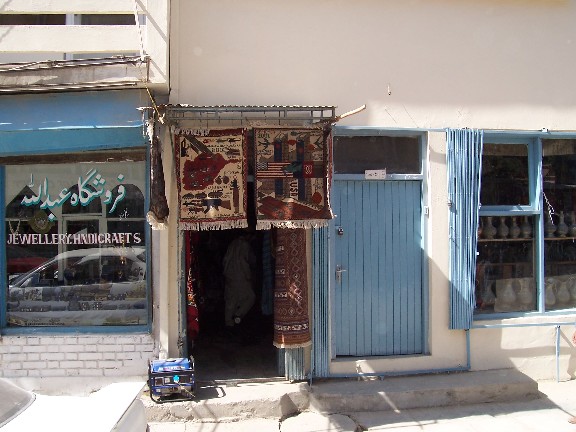 |
October 2:
I have just succeeded in hiring a driver/guide/translator/bodyguard (complete with AK-47 under the seat) to take me to Jalalabad tomorrow in search of the elusive poppy. He is going to cost me about $100 a day ($75 plus expenses).
I am supposed to fly out Tuesday afternoon. But although J'bad is only 100 miles away, the roads are so shitty it will take six hours or so just to get there, and it will take some time to accomplish the actual mission. Since people are very scared to drive that "highway" at night because of bandit activity, it is likely that I will have to overnight in J'bad. I could theoretically make my Tuesday afternoon flight if we left J'bad at dawn, but that's cutting it too close for comfort.
Given that there are other things I still want to do, other people I still need to talk to, I now say we should keep me here until Friday (or whenever the next Ariana flight to Dubai is -- I think they only do Tuesday and Friday).
October 2:
The hunt for the elusive Afghan opium farmer continues. I have feelers out with several people, local Afghans and journalists, but I continue to be frustrated. After I send this, I will be heading out to check with one of them about any prospects.
Here is the dialog I had with Ahmed, my Kabuli contact about finding the opium farmers and merchants:
"Ahmed, I want to meet the opium farmer or the opium seller."
"Not here in Kabul, must go outside the city. But big danger, big problem for you, Taliban man there."
"Ahmed, big danger for you, too?"
"No, not for me, for you. I Pashtun man, they Pashtun people."
"Well, let's go then!"
"I don't know where is opium man."
"Ahmed, I have $50 for man who take me to opium man. I give to first guy who take me. I want to give to you, my friend."
"I call my friends, my cousins. I come tell you what I hear."
So now I'm waiting. But as I said, now I'm going to talk to another guy.
October 1:
The famous Chicken
Street, where the global backpack trekker set came to buy hippie shit during
the days of the hippie trail in the 1960s and 1970s. It's still full of
hippie shit -- carpets, jewelry, boxes, clothing, as well as antique rifles
and muskets, switchblades, lapis lazuli (comes from Afghanistan), and much
much more.
Be prepared to be assaulted
by money-hungry merchants -- "You just look, no have to buy!" -- little
beggar kids "Hello, my friend, I be your bodyguard", those blue burka women
with sick babies, and mujajadeen vets missing legs from the mines, all
wanting money. "Baksheesh, baksheesh"
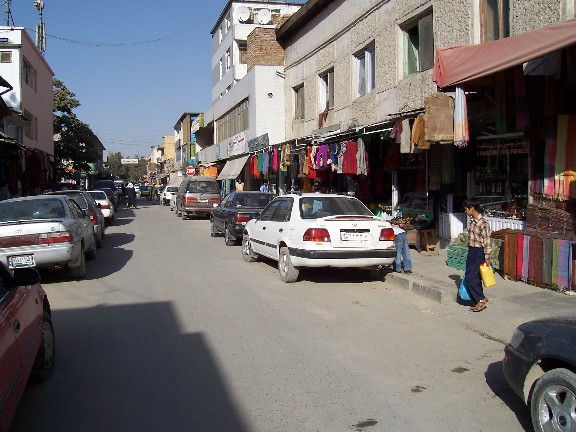
Editor's Note:
It's easy to forget that not so long ago the tensions currently plaguing
our world were not all issues. Movies as recent as the Indiana Jones series
portrayed the Arab world as "exotic" for the western imagination, not exactly
safe but not especially angry toward America. Phil's historical note about
the "hippie trail" brought that to mind for me. Not a drug policy issue,
just a thought about where we've been and perhaps again could be. - DB
more pictures...
|
Kabul street scene
|
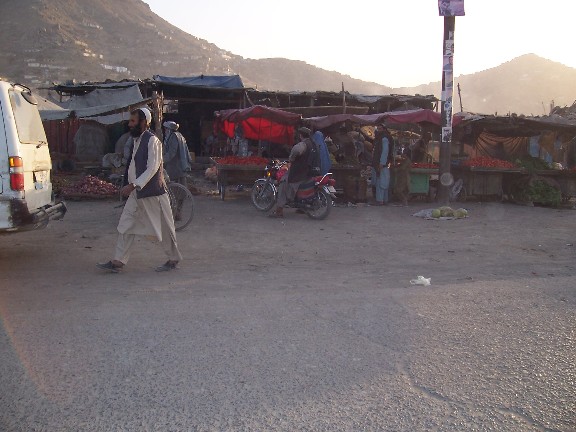 |
|
corner vendor, Chicken Street
|
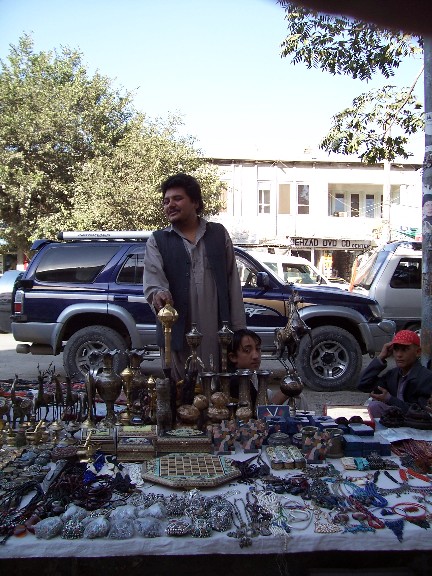 |
|
Senator Pierre Claude Nolin, Canada; Vanda Felbab-Brown, fellow, Belfer Center for Science and Intl. Affairs, Kennedy School of Govt, Harvard; Raymond Kendall, Honorary Secretary General and former chief INTERPOL; Prof. Gul Rahman Qazi, head of Dept. of Law and Political Science, National Center for Policy Research, Afghanistan; Hugo Warner, research fellow, British Institute of International and Comparative Law
|
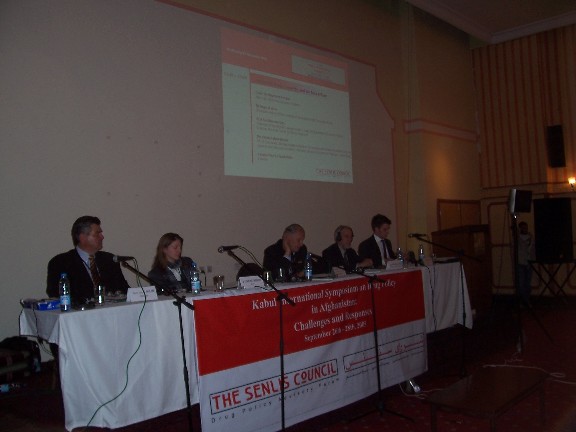 |
|
Francisco Thoumi, founding director of the Research and Monitoring Center on Drugs and Crime, Univ. of Rosario, Colombia; Tony White, Chief of Supply Reduction and Law Enforcement, UNDCP, 1997-2001; Guillaume Fornier, Senlis Council Afghan country manager; Dr. Ambros Uchtenhagen, Dept. of Social Psych, Univ. of Zurich, Switzerland
|
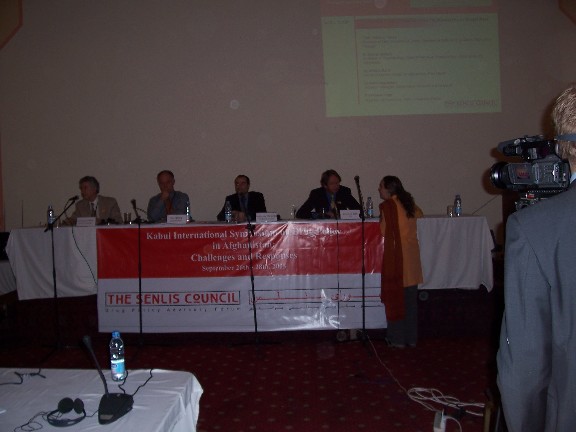 |
|
conference audience
|
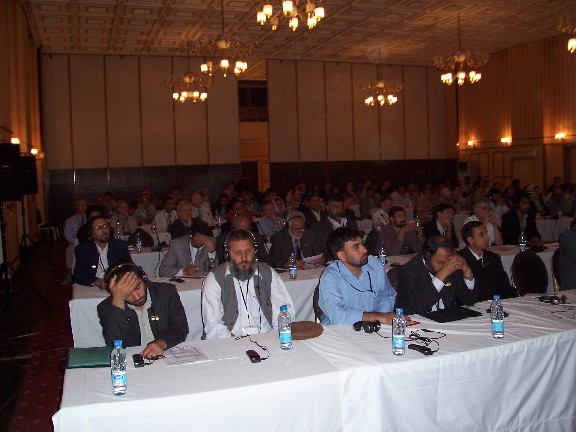 |
|
Phil at the Mustafa
|
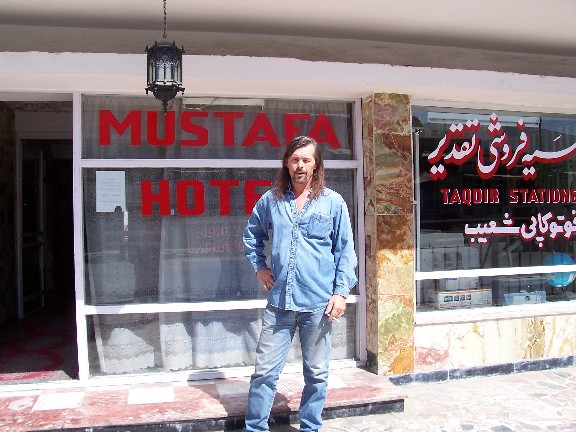 |
October 1:
Fighting continues in
Pashtun country (basically the whole south and east of the country) despite
the lull that everyone expected after the elections. In addition to the
seven dead US troops since I've been here and the suicide bomber at the
Afghan National Army base, four more US troops were wounded by a roadside
bomb in Kunar province, the Pakistanis are attacking border redoubts with
helicopters, and Taliban and Afghan soldiers continue to die here and there
in other clashes.
The UN has now restricted
the movements of its workers in the wake of the suicide bombing -- the
US Embassy folks were already basically restricted to the fort, er, I mean
embassy -- and the Taliban says it has 45 more suicide bombers waiting.
I've been having interesting
discussions with a former State Department oficial who says the Taliban
is essentially a spent force, but it seems like they can still bring the
pain, if not regain control of the country.
Meanwhile, a US security contractor is now reported to have shot his Afghan interpreter to death during an argument in the interior and has now hopped a chopper back to Kabul. And somebody has just discovered the bodies of 500 former communist government soldiers in a mass grave. They were supposedly executed in 1992, and some of the guys who are running for parliament are implicated in the murders, the local press says.
October 1:
I'm getting frustrated.
It is extremely difficult to get anything done. Yesterday, the city was
totally shut down for the "weekend," but the weekend actually seems to
include Sat and Sun, at least as far as government and NGO offices are
concerned. Ah, the three-day weekend.
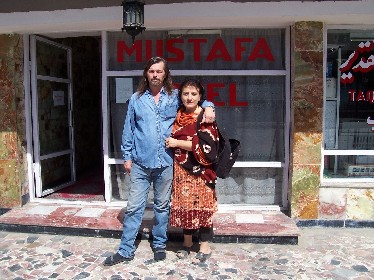 |
|
| Phil Smith & UK's Andria Efthimiou-Mordaunt outside the Mustafa Hotel |
|
The electricity was out
city-wide yesterday from 6:30am to sometime after 8:00pm. People in the
city have adapted; many private homes (at least the ones with some money)
and businesses have generators, but that doesn't help if they're closed,
which just about everything is on Friday. I would estimate that 5% of storefronts
were open. I spent hours and dollars yesterday fruitlessly searching the
city for an Internet cafe that was either open or had a generator. The
Intercontinental Hotel, hang-out of hotshots local and foreign, of course
has generators, but when I went there during the day, their servers weren't
working. After 12 hours without electricity, several of us desperate journalists
went back to the Intercontintental, which is always well-guarded, and by
then the Internet was working. Shortly after that, the lights came back
on.
My hotel, the Mustafa
Hotel, is a hang-out for low-rent journalists (no New York Times reporters
there!), and one of its selling points is its Internet access, but the
owner of the hotel refuses to buy a generator so that we can have access
when the power is out. He does have one generator, but it only powers some
emergency lights, oh, and a section at the back of the hotel for long-term
residents, who are mainly foreign contractors. Very frustrating. When I
return to the hotel after this, I will let them know that I am blogging
this information, and that I cannot recommend the place to anyone who has
to work on deadline. Right now, I'm writing from a place that does have
a generator, but it makes me wonder why I'm paying good money for the Mustafa.
It's not that I want to slag them; the staff is very helpful and it's not
too expensive ($30 a night, plus $5 for the Internet access), but that
I want them to fix the problem.
I am also having difficulties
arranging to meet opium farmers. The NGOs with whom I was in contact earlier
and who said it could be arranged are now saying it is "very sensitive."
I am desperately using every contact I can think of to try to set this
up. I do have some contacts with journalists who are based here, but nothing
has developed yet -- and time is running out.
I'm working various angles on
the opium farmers/merchants. I've got people working on it. The kind of response
I typically get from the Afghans is: "Not here in city, must go outside, very
big problem, very dangerous for you, Taliban man." Then I say, "Very dangerous
for you?" Then he says "no" and I say, "Let's go."
Another difficulty is
the horrendous state of the roads. I am basically limited to the immediate
Kabul area because it takes all day to go about 100 miles -- and these
are the national highways. The US and the international community has been
here for nearly four years now. I don't understand why they can't build
a goddamned road or get reliable energy supplies for the Kabul city. If
this is supposed to be nation-building, I have to say the Western powers
are doing a pretty shitty job of it.
I would ask the US Embassy
about it, but they, too, now seem uninterested in talking to me. The nice
press officer with whom I was in contact has now decided I don't qualify
as a person from a recognized media organization, so no press briefings,
and while he said he was trying to arrange for me to meet with the narcs
and the security guys, nothing has come of that.
Meanwhile, people are
waiting for the parliamentary election results, and the interior minister
has resigned, saying that the government is failing to act against people
in the government linked to the drug trade, especially some provincial
governors. It's a tough nut for the Karzai government -- if he acts against
those people, he weakens his own government; if he doesn't, he helps to
build a narco-state.
This is a real issue,
one that was much discussed at the symposium: What do you do with these
powerful people tied to the drug trade? There is strong sentiment among
leading Afghan legal and political figures to arrest and try and imprison
them, but there is also support for the idea of reintegrating them into
society. It reminds me of South Africa after the end of the apartheid regime:
Do you go for the war crimes model or the truth and reconciliation model?
Do you try to throw them in jail, or do you give them amnesty (especially
if they'll put their fortunes into developing the county)? I'll write about
this issue for the Chronicle next week.
October 30:
Three feature reports
from Phil, and a commentary by Dave Borden, all in this week's Drug
War Chronicle.
Thursday, September 29:
No post from Phil today,
because he has been busy preparing this week's issue of Drug
War Chronicle. The issue, which is posting here tomorrow morning,
will include three Afghanistan feature stories:
ON THE SCENE
I: EUROPEAN THINK TANK CALLS FOR LICENSED OPIUM CULTIVATION AT AFGHANISTAN
CONFERENCE -- RESPONSE VARIED
Amidst a burst of publicity
and news coverage ranging from Kabul TV to the New York Times, drug policy
thinkers, researchers, and political figures from around the world mixed
with Afghan government officials, treatment and addiction specialists,
law enforcement representatives, interested Afghan citizens, and representatives
of neighboring countries at a three-day conference in Afghanistan this
week.
ON THE SCENE II:
AFGHANISTAN'S NEIGHBORS LOOK WITH INTEREST AT LICENSING PROPOSAL
Most Afghan opium ends
up not in the west but in neighboring countries like Iran and Russia.
Representatives of those countries attended this week's conference in Kabul
and promised to bring the idea of buying the nation's opium supply for
the medical market back to their bosses.
ON THE SCENE III:
BEYOND TREATMENT AND PREVENTION -- HARM REDUCTION IN AFGHANISTAN
Afghanistan has its
share or more of drug addiction. But the nation of 25 million people
has a mere 100 treatment beds, and a lone needle exchange program sitting
on a dusty side street in Kabul relies mostly on volunteers to help stem
a looming epidemic of HIV and Hepatitis in the city's injecting population.
With the conference ended,
Phil will be spending the next week or so out and about in Kabul as well
as the countryside. We are anticipating getting some fascinating
stuff back. So stay tuned, and don't forget to check back tomorrow to read
those articles (as well as our usual reporting) in full.
Wednesday, October 28:
The suicide
bomber didn't get me -- alive and well. Didn't hear the bomb (it's
a big city), but the sirens are blazing now. Latest reports say 12 dead,
half of them Afghan soldiers, 28 wounded. The Taliban is taking credit.
Makes sense. The city is actually pretty safe; such incidents are rare.
It's different out in the countryside, especially the south and east, but
I ain't goin' there. Seven US troops killed here since I've been here,
but all out in the badlands. I may go north in a couple of days; it's supposed
to not be so bad. This kind of stuff wasn't supposed to happen now. The
expectation was that the violence was connected to the electoral campaign that
ended last Sunday.
| 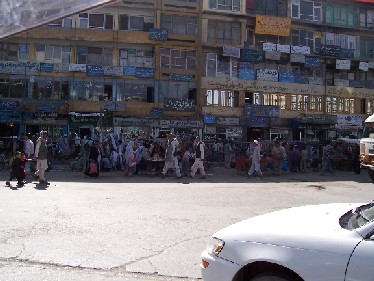 | | on the streets of Kabul... |
Nothing coming tonight.
I was working on the Chron, but that's been disrupted. The hotel I'm at
is full of freelancers and some of them just got back from trying to get
to the bomb site. They didn't get there, ISAF and Afghan Army checkpoints
stopped them, but now they're all jazzed and wanting me to check various
sites to see if anybody else has any better photos. Also, these guys are
reporting gunfire in the night on the way back here. I didn't hear it,
but it could be the start of some excitement here. There have been rumors
that Al-Qaeda guys snuck in the country in the last few days... Anyway,
difficult to work right now. That means I have to get up and crank all
day tomorrow.
It's kinda morbid the
way these guys get all excited at the prospect of some blood and guts.
But they're all looking for the pic that's going to make their careers.
War photo-journalists, just like the good old days in Central America.
Tuesday, September 27:
I am not well. Must
have eaten bad kebab somewhere. Not well, but not bedridden. Sorry no pics, no
time, off to conference soon; I'll send some tonight. For today:
The Senlis Council
yesterday officially unveiled its report on the feasibility of licensing
Afghan opium production for the legitimate medicinal market, but UN and
Afghan anti-drug officials didn't wait to read the study before dismissing
it. In yesterday morning's newspapers, Afghan Counter-Narcotics Minister
Habibullah Qaderi was quoted as saying, "As far as the licensing at this
moment is concerned, I am saying no. I'm not in favor because it jeopardizes
the whole of our effort. There would be anarchy in the country now. It
would create a lot of problems."
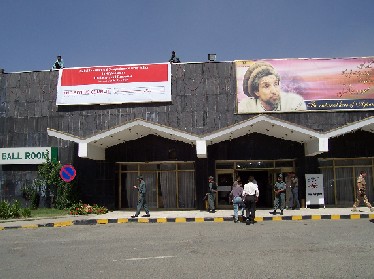 |
|
entrance to conference site
(Senlis Council banner to upper left -- click here for hi-res version |
|
Similarly, the UN Office
on Drugs and Crime has rejected the proposal, according to a Reuters report.
There is already a sufficient supply of opioid pain medications to meet
global demand, UNODC said. It also argued that buying farmers' crops in
a legitimate market would not be economically viable and that such a scheme
would "send the wrong message" to Afghan farmers.
Nonetheless, the symposium
has excited significant attention in the Afghan press (and beyond), and
the opening press conference was very well attended. Senlis Council head
man Emmanuel Reinert professed to not be overly concerned over initial
negative responses from the Afghan and UN drug fighters, suggesting that
they might want to actually read the report before dismissing it and that
it could serve as a point of departure for further discussion.
In the meantime, my reporting
on the extent of harm reduction activities in the country has been criticized
by an advisor to the Counter-Narcotics Ministry, who says I have understated
the extent of such activities here. I have offered to meet with him so
that he can educate me on the errors of my ways. We'll see if he replies.
The sting of the criticism is somewhat alleviated by the knowledge that
guys like that are actually reading what I write.
Now, it's off to day
two of the conference.
Editor's Note: Given the
profound level of poverty afflicting this country, it seems irresponsible for
officials to flatly dismiss a possibly viable option for licit economic
opportunity. Australians, among others, get to grow opium for the
legal market in opiates. Why can't Afghans? It's especially troubling coming
from an agency of the UN, on which Afghanistan's government is dependent for
critical support -- drug war intimidation is everywhere. And let's get real --
opium is the mainstay of the Afghan economy. That message speaks louder than
the government or the UN ever will.
- Dave
Borden (comfortably at home in Washington)
September
26:
On the outskirts
of Kabul, down a dusty side road, lies the Nejat Center, one of the only drug
treatment and harm reduction centers in the capital city, and indeed, the whole
country. An outgrowth of a program begun across the border in Peshawar, Pakistan,
in 1991 to deal with what would become millions of refugees fleeing factional
violence in Afghanistan, Nejat opened its Kabul facility in 2003. It still
deals primarily with refugees, this time Afghans returning home as the
violence has subsided who developed serious opium and/or heroin habits
as they rotted in Pakistani refugee camps for years.
| 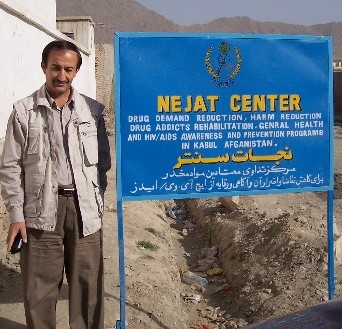 | | Nejat Center, Kabul |
At Nejat, Dr. Tariq Suliman
leads a small team of doctors and social workers (many of them volunteers,
some of the social workers graduates of his program) who bring addicts
through a comprehensive rehabilitation program beginning with a one week
detox followed by a second week of orientation and then a month-long rehabilitation
program. During the program, clients are taught not only to resist the
lure of opiates but also social and job skills, such as learning to weave
carpets or make shoes, and some will even be able to get small loans to
open small businesses. (Unsurprisingly, when small businesses often consist
of a cardboard or wood shack and whatever the product is, the overhead
to open and operate a small business in Afghanistan is very small.)
According to Dr. Suliman,
there are 60,000 drug addicts in Kabul, a city of 3 million, but his program
can only handle four beds in detox and perhaps 20 people in the rehab program.
The number of drug addicts in the country as a whole in unknown, said Suliman,
because no one has ever tried to count them. Still, he said, opiate addiction
is rife across the country.
It's not just drug treatment.
Nejat also includes a harm reduction component, with an active needle exchange
program, as well as condom distribution. With AIDS a rising problem, both
are critical to the effort to get a grip on the epidemic. And while the
inpatient treatment program is limited to men, the center's outreach programs
also target women and children, a population typically neglected not only
in drug treatment programs but by Afghan society as a whole. The silent,
unseen part of the Afghan population, women are expected to be behind the
walls of home and not out on the street.
This is a brief introduction
to Nejat and harm reduction in Afghanistan. Look for more in Drug War Chronicle
this Friday.
Some pictures sent by Phil on Monday, September, 26:
|
rehabilitation group, Nejat
Clinic
|
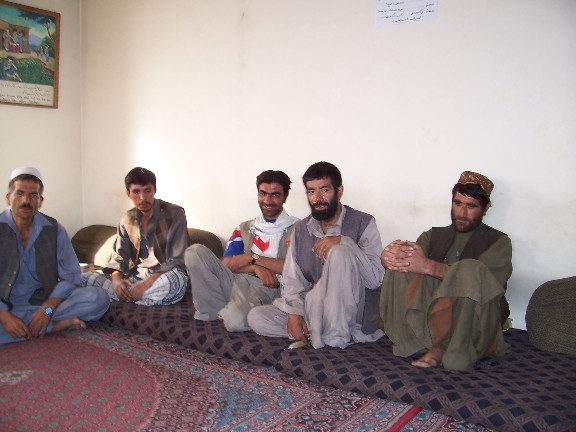
|
|
Anti-drug artwork, Nejat: picture on left has man wrapped up in evil opium tendrils, picture on right has father smoking heroin while his family cries.
|
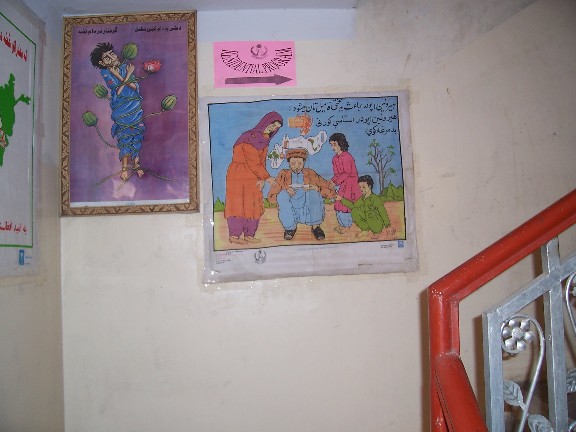
|
|
Young girl in front of buildings
destroyed in 1990s fighting between various mujahadeen factions. (After
they drove out the Russians, they fought among themselves, making the Taliban
an attractive option for war-weary Afghanis.)
|
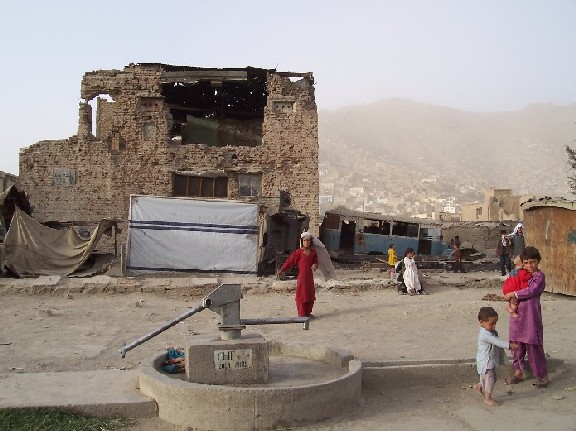
|
Sunday, September 25:
Today we went to the
Nejat Center, a drug treatment and harm reduction center on the outskirts
of Kabul. It has detox, inpatient treatment (for men), outreach activities
(for men and women and children), and also does needle exchange and condom
distribution. They lack money, no surprise. The head doctor says there
are 60,000 addicts in Kabul, but they have fewer than 20 beds. I'll do
a feature on this place this week.
I have nice street scene
pics and nice pics from the center, but this connection is so slow right
now it hadn't sent it after 10 minutes. I'll try again in the morning --
provided the power is on and the server is a little quicker.
Saturday, September
24, 2005:
Today I went to the US Embassy
to check and hopefully speak with the press officer with whom I have been
communicating. He wasn't there and won't be there until Monday. But just
going to the embassy was quite eye-opening. It's well down a pretty much
blocked off street with multiple checkpoints and lots of soldiers of all
stripes -- Afghan military, US military, ISAF forces, and oddly enough,
British mercenaries doing security for the embassy itself. It is hidden
behind high steel walls topped with concertina wire, much like many of
the US embassies I've seen in other zones where the US is "lending a helping
hand," such as Mexico and El Salvador. These facilities have the aspect
more of an armed compound or a fort than an embassy.
 |
|
| US Embassy in Kabul |
|
Interesting politics here.
They just held parliamentary elections on Sunday; the results aren't expected
for maybe another three weeks because some of the ballots are coming in
by donkey or camel from really, really remote places. But interestingly,
Karzai went against the recommendations of the UN and US and made the elections
non-partisan. People had to vote for individual candidates instead of candidates
representing a party. The thinking is Karzai did this to weaken any organized
opposition in the parliament, but that may not have worked. The Northern
Alliance guys, headed by Yunus Qanooni, think they are
going to form the biggest bloc, and they will be a problem for Karzai,
who booted a bunch of them out of the government in December. Karzai himself
seems to be seeking to build a Pashtun coalition, and boy does he have
some strange bedfellows: former Taliban, the Khalq wing of the Afghan Communist
Party, and former Pashtun mujahadeen groupings.
Karzai last week also made
noises about ending the US military presence here, as well as criticizing
US air bombing campaigns, and demanding that US troops not raid Afghan
homes without prior approval from the Afghan government. The top US military
leaders here soundly rejected the notion that they were no longer needed,
declared the air campaigns essential, and totally neglected to comment
on Karzai's complaints about home invasions. The thinking is that Karzai
needs to firm up his Pashtun base and is doing so by being a little anti-American.
I'm scheduled to meet up
with Andria Mordaunt in a little bit; we'll see what she's got cooking.
She said she should be able to get us a meeting with Afghan harm reductionists.
Who woulda thunk there was any such critter?
More later if possible --
I will send things when I can because the power and thus the Internet connection
are not reliable.
Friday, September
23, 2005:
I made to Kabul
this morning and, man, this place makes rural Mexico look like Europe!
Kabul ain't so nice despite its spectacular setting amidst huge mountains.
Everybody uses diesel instead of gas (almost everybody), so there's lots
of diesel smoke, and then there's the dust. Dust, dust, dust. The sky over
the city is a hazy brown, but I don't know how much is pollution and how
much is dust. I was in a park this afternoon and some kid kicked his soccer
ball so it got stuck in a tree. When they threw rocks at it to try to knock
it down, every time a rock hit the tree, a big cloud of dust would puff
out. Also, nobody takes credit cards and there aren't any ATMs. It's a
good thing I cashed a lot of money before I came.
I'm pretty dingy after
this mind-numbing journey:
-
Tuesday – drive 400 miles
to Seattle (from eastern British Columbia)
-
Wednesday – Fly from Seattle
at 11:00am PDT to Cincinnati to London, arriving at Gatwick at 8:00am Thursday
local time.
-
Thursday – Fly from London
to Dubai (it looks like one gigantic megamall and is priced accordingly;
I could have gotten a hotel room... for $150), get there at 8:00pm, layover
until 6:00am Friday morning.
-
Friday – Leave Dubai at
6:00am, arrive in Kabul 9:00am local time. It's now 6:00pm local time.
So... I slept for about
3 hours flying across the Atlantic (thank goodness for sleeping pills,
and praise the lord for a flight empty enough for me to grab a three-seat
bench at the back of the plane). Wow, I think that was the last time I
slept... I'll take another sleeping pill soon and crash out probably until
morning. I am beyond jet lag at this point.
| 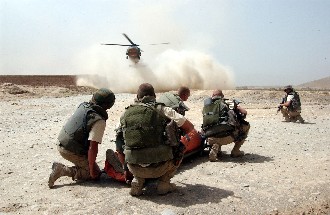 | | war and more war in Afghanistan |
Today (Friday) is the
weekend here, so many places are closed. I will try to start going to government
and NGO offices tomorrow, although I expect Marco Perduca and Andria Mordaunt
to show up then, too. The conference starts Sunday at the Intercontinental
– Kabul's only five star hotel – which was guarded by American soldiers
in armored vehicles, guns at the ready, when I got there. They have a huge
"No Weapons" sign with a circle and slash over a machine gun, but I guess
it doesn't apply to the ISAF (International Security Assistance Force).
My hotel also has the "no weapons" sign, and it has barrel-sized concrete
barriers to prevent a car bomber from rolling right up into the lobby.
My Dari vocabulary is
expanding rapidly – from two words to about six words in one day! That's
just one of the languages they use here.
I've heard the muezzin
– the Islamic call to prayers – several times now, the first time in Dubai
just before dawn. It is Friday; that's the big go-to-the-mosque day.
Women here are conspicuous
by their absence. At any given moment in any given location, probably 80%
of the people on the streets are men or boys. Lots of women still wear
the head-to-toe blue burka with veil. Looks pretty weird and reminds me
somehow of Dune. There must be young women who have adopted Western styles
– I see their portraits in the photo studios – but I haven't actually seen
any of them.
It is a land of many
hats. There's those little white skull cap things and there's this flat
pancake kind of a hat that the Tajiks (the Northern Alliance dudes who
actually run the government) wear, and there's a sizeable percentage of
guys wearing Arab-style kaffiyas, and the Afghan soldiers with their peaked
baseball cap thingie, and the ISAF soldiers with their combat helmets.
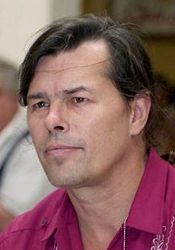 |
|
| Phil Smith |
|
And it's a surprising
ethnic mix. There are a lot of Pashtuns (that's what the Taliban were),
and Tajiks, and the occasional blue-eyed Nuristani (reputed to be descendants
of Alexander the Great's invading army circa 330 BC), and a bunch of Chinese-looking
folk. They're the Hazaris, who live in the mountainous and really inaccessible
interior. Then there are Kirghiz and Uzbeks, although they are mainly in
the North. Warlord General Dostum is an Uzbek, warlord General Ata Mohammed
is a Tajik; they wage occasional battles for control of Mazar-i-Sharif
and the lucrative cross-border trade, which of course includes opium and
heroin.
People look at me funny
here, even though I have my hair in a ponytail and about a week's worth
of beard and mustache. Boys on bicycles laugh and say incomprehensible
things to me. Maybe they're making fun of the ferengi (foreigner), but
I just grin back at them.
If you can make anything
bloggable out of this, go for it. More tomorrow.
- Phil
P.S. The hotel I chose
because it has wireless also has almost daily power outages. Today, after
the outage ended, the wireless came back up, but it is incredibly slow
even though we're getting a very strong signal.
more coming soon...
|